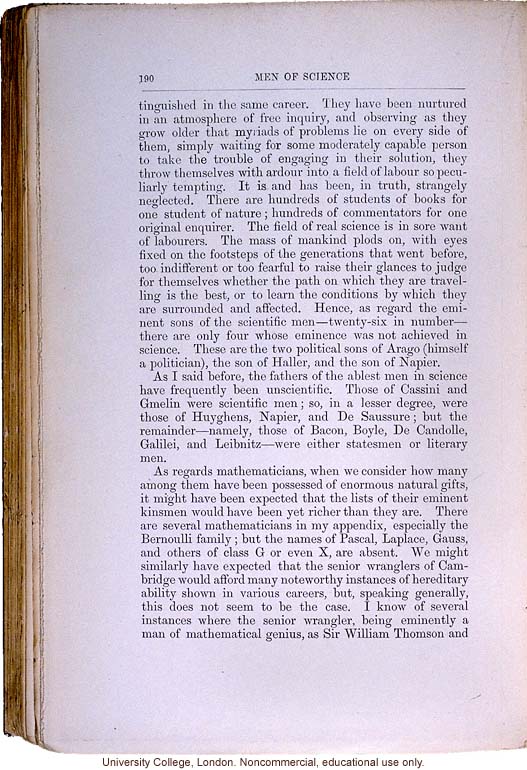Hereditary Genius: An Enquiry into Its Laws and Consequences (2nd ed.), by Francis Galton, selected pages (10)

Hereditary Genius: An Enquiry into Its Laws and Consequences (2nd ed.), by Francis Galton, selected pages (10)
2027. 190 Men of Science [hairline rule width of page] tinguished in the same career. They have been nurtured in an atmosphere of free inquiry, and observing as they grow older that myriads of problems lie on every side of them, simply waiting for some moderately capable person to take the trouble of engaging in their solution, they throw themselves with ardour into a field of labour so peculiarly tempting. It is and has been, in truth, strangely neglected. There are hundreds of students of books for one student of nature; hundreds of commentators for one original enquirer. The field of real science is in sore want of labourers. The mass of mankind plods on, with eyes fixed on the footsteps of the generations that went before, too indifferent or too fearful to raise their glances to judge for themselves whether the path on which they are travelling is the best, or to learn the conditions by which they are surrounded and affected. Hence, as regard the eminent sons of the scientific men -- twenty-six in number -- there are only four whose eminence was not achieved in science. These are the two political sons of Arago (himself a politician), the son of Haller, and the son of Napier. As I said before, the fathers of the ablest men in science have frequently been unscientific. Those of Cassini and Gmelin were scientific men; so, in a lesser degree, were those of Huyghens, Napier, and De Saussure; but the remainder -- namely, those of Bacon, Boyle, De Candolle, Galilei, and Leibnitz -- were either statesmen or literary men. As regards mathematicians, when we consider how many among them have been possessed of enormous natural gifts, it might have been expected that the lists of their eminent kinsmen would have been yet richer than they are. There are several mathematicians in my appendix, especially the Bernoulli family; but the names of Pascal, Laplace, Gauss, and others of class G or even X, are absent. We might similarly have expected that the senior wranglers of Cambridge would afford many noteworthy instances of hereditary ability shown in various careers, but, speaking generally, this does not seem to be the case. I know of several instances where the senior wrangler, being eminently a man of mathematical genius, as Sir William Thomson and [end]
- ID: 11937
- Source: DNALC.EA


